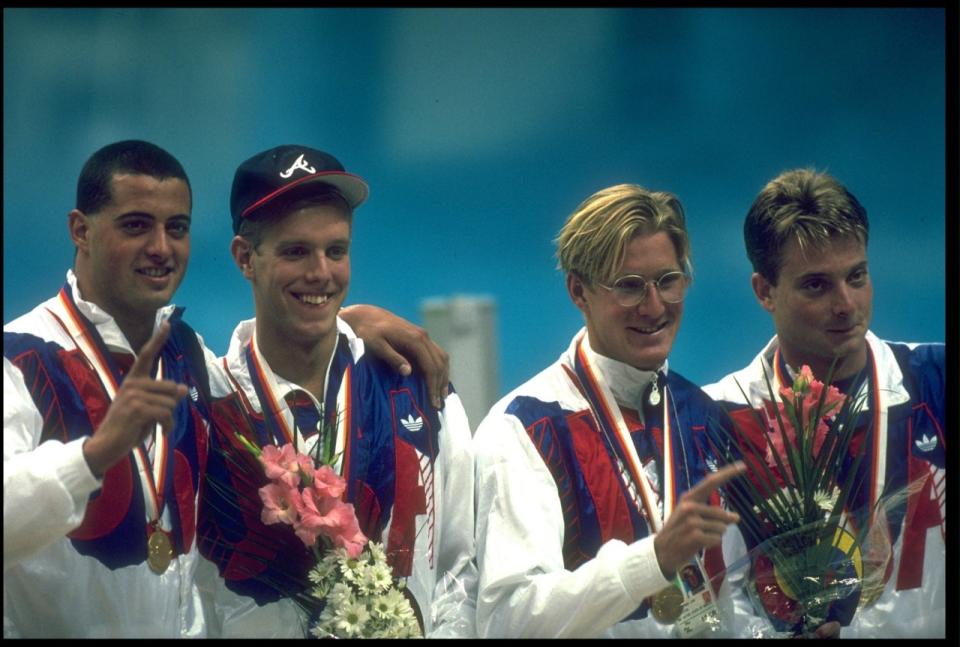The first Ryan Lochte has advice for the current Ryan Lochte: Own your mistake
Medal count | Olympic schedule | Olympic news
RIO DE JANEIRO — Gold-medalist American swimmer causes international uproar with late-night antics, angers foreign government and embarrasses USA Swimming.
The story of 2016? It is now, thanks to Ryan Lochte.
But it’s also a story from the 1988 Summer Olympics in Seoul, South Korea.
Here’s the beginning of a New York Times article from Sept. 25 of that year:
“Troy Dalbey and Doug Gjertsen, both double gold-medal swimmers for the United States, were dropped from the squad today following their arrest on charges of stealing a marble lion’s head valued at $830 from a hotel.”
[Featured: Why Michael Phelps is retiring for good this time]
The story is eerily similar to the one making headlines now. The swimmers were partying after their last night of competing, they saw a decoration on a wall in a hotel, they decided to take it, they left the premises, someone noticed and followed them and a confrontation took place.
“He was belligerent and started swinging at us,” Dalbey told the Deseret News. “He wanted to fight. We didn’t swing back. All of a sudden there were about 10 Korean policemen around us, along with some MPs (military police, from the nearby U.S. Army base). They took us to a police station, where the Hyatt employee said he wanted to press charges.”
Sound familiar?

The pair spent more than seven hours at two police stations, and the United States Olympic Committee ordered both out of the host nation as soon as local authorities would permit. Many Koreans wanted the swimmers to be restricted from leaving. A double gold-medal performance in the pool had morphed into a nightmare.
“It damaged my reputation irrevocably,” Dalbey said Thursday night from his home in Arizona.
He was 20 then, and he is 47 now. He was suspended for two years (later reduced to 18 months) and it altered his love for the sport of swimming. He has three children now, and he’s had to explain to them what he did 28 years ago. After this week’s headlines, he’ll probably have to explain it again.
“They’re going to get a better understanding of the publicity of what happened,” Dalbey said. “I talked to them and made it clear I got into trouble. ‘You’re going to get all kinds of examples in life; this is one you don’t want to mimic.’ ”
Part of Dalbey’s reaction to the Lochte incident was humor. “Whew! I’m no longer going to be known for this!” he joked. “It’s going to be Lochte’s problem.”
But his main thought was for the other three swimmers, around the age that he was, acting foolishly after their last night swimming, and having no idea what’s coming next.
[Related: Inside the place where Team USA hopefuls become Olympians]
“My heart goes out to the guys who are stuck there,” Dalbey said of Jimmy Feigen, Jack Conger and Gunnar Bentz. Conger and Bentz left Brazil Thursday night after being questioned by police. “You had younger guys, looking up to [Lochte] their entire lives, and they were asked to cover for him.”
Dalbey takes full responsibility, even now. He sounds remorseful, even now. When asked what he was thinking, he said, “I wasn’t. I had just won my second gold medal and I was done competing. I wasn’t thinking, obviously.”
What he did right was what Lochte apparently did not: face the music. Dalbey and Gjertsen quickly sent out a statement expressing that they were “very sorry that we have embarrassed the U.S. Olympic teams, the American people, our friends and relatives by our actions.” (And by the way, when Dalbey’s dad called, he told the truth.)
What nags at Dalbey (and many, many others) isn’t the mistake, but the seeming cover-up. He displaced property, like Lochte and the others allegedly did, but he owned his behavior. Lochte had the chance to own it, and he apparently didn’t.
“Apologize,” he said of Lochte. “Take responsibility for it. I think he should advocate on behalf of the other athletes, take full responsibility. This is something that, unfortunately through embellishment and not thinking before he was speaking, this is something that has become an international incident.”
Throughout Thursday night’s interview, Dalbey kept coming back to the younger swimmers. Lochte is likely done with the sport, at least at the elite level, but the others are not.
[Featured: Greg Louganis explains why “I thought I was going to die” before 30]
“My hope is that U.S. Swimming looks at this with lenience with the other guys,” he said. “This is going to impact their lives for a long time in a way they can’t fathom at this point.”
It took Dalbey a long time to love swimming again, he said. He’s now an executive in a solar power company, and doing well. Coaching the sport brought him back to a place where he could appreciate being in the water like he did before he erred. (Gjertsen also went into coaching and is now in the Georgia Aquatic Hall of Fame.) Dalbey still has his gold medals, but they are locked away and he hasn’t looked at them for a while.
“It was a humbling experience,” he said. “It took me until I was done with my career to be able to look at it without any emotion and see it for what it was.”
What it was: a reckless mistake made in the euphoria of glory, which he fortunately didn’t make worse by lying. What it is: a bad memory and a good lesson.
“How you behave in someone else’s land,” he said. “That’s traveling 101. You might want to watch your ‘P’s and ‘Q’s.”
Good advice for Ryan Lochte, from someone who knows.

